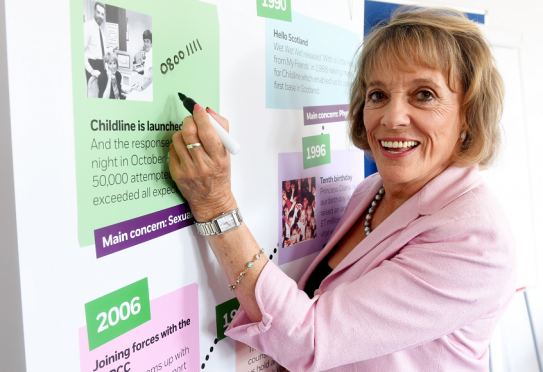Over my life time I have met many volunteers, without whom our city, and indeed our country would grind to a halt.
Most of my own volunteering has been with the disabled community. However, about two years ago I wanted to do something, in my own small way, to help those children who were so desperate for help it could often lead to self-harm or suicide.
It just screamed at me: for goodness sake, why can’t we do something to help those kids who haven’t yet had a life, to turn things around for them and help them start to see there is a positive future? How could they have been left to feel so undervalued and unimportant when they are the future?
In 2017 there were 6,213 suicides in the UK. Men were three times more likely to take their own lives than women, though women are more likely to self-harm.
We all know the work which is done in this regard by the Samaritans. But I wanted to see if I could help before they reached adulthood.
In our country we must be able to help our young people cope with life in a way that is a positive experience for them. After all, the young people of today are tomorrow’s leaders, business people and entrepreneurs. It’s just not right that they start their lives with stress and situations which are intolerable.
With this in mind, I approached Childline. It was founded in 1986 by Esther Rantzen. At that time there were 40 volunteers who struggled to cope with 50,00 calls from children under 19 desperate for help. The service was, and remains, free and totally confidential. It is available day and night, seven days a week.
When the service was set up the main concern from young people was physical abuse.
That was followed by bullying- still very prevalent today. In fact, any parents out there whose children suffer bullying at school should get in touch with the education authorities. They are required by law to have an anti-bullying policy which is workable and protects the child. Too often schools do little to assist when needed.
Over the years, with the advent of social media and mobile phones, the concerns for young people have increased. The underlying worries for young people today remain broadly the same though the most common issues are mental and emotional health, family relationships, bullying, and suicidal feelings or thoughts. Fortunately, the skills society has for dealing with these issues today have, I’m pleased to say, greatly improved. In a more enlightened world, we have changed to suit the times.
The training for Childline volunteers is extremely thorough. There are practical discussions and the chance to learn from senior colleagues with many years’ experience. I considered it a valuable lesson from which we could all benefit.
Following training, I took my place at a Childline contact centre in Aberdeen where I was supervised and assisted during my first shifts. Also in the room are compassionate and knowledgeable supervisors with a wealth of experience, who can support a volunteer through a case if required. No one has to struggle on their own.
Suicidal thoughts or feelings contributed to 24,549 contacts in the current year. 68% of the calls were from girls as opposed to 50% from boys. And the bulk of the children are in the 12-15-year age group.
Young people under stress need a calm listening ear. A person who can chat to them without judging them in any way is invaluable. In this respect Childline is a welcome life line to many young people.
Childline also has a very effective website which provides useful contact information as well as a noticeboard where young people can share their thoughts and concerns with their peers. This website has had a staggering 3.1 million visits.
In today’s world there are so many pressures on young people. Drugs have always been around, and as we have never successfully conquered this problem, it is likely it will always be with us. Stress and mental health are at long last being recognised as serious issues to be dealt with. Issues like family relationships, transgender issues and of course social media, which puts unnecessary pressure on young people to be “liked” on their Facebook or Instagram pages. The idea that you should have a certain body “image” is also the cause of many issues. The pressure to share naked pictures of themselves in relationships, as well as online bullying and grooming are a shameful blight on our society which causes great emotional stress to young people.
Their need for advice and support is crucial when trapped in these situations.
W have yet to get our laws up to date on the social media side of things. We must move to protect our children and tackle the dark side of the web. In my view Governments are moving far too slowly in this respect. Internet providers must be regulated and held accountable. They currently profit from our children and that is totally unacceptable in our society today.
Len Ironside is a former champion wrestler who served as an Aberdeen councillor for 35 years, four years as council leader

